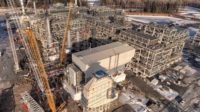The board of engineering firm Michael Baker Corp. starts 2013 facing new pressure from stockholders who have been seeking to boost share value for months. Now one of the Pittsburgh-based firm's investors is pushing a buyout offer, with another urging it to accept. The overture comes in the midst of a search for a new CEO.
The board and long-time Chairman Richard L. Shaw, 85, have to make a "compelling case" for the firm to stay public and independent before its proxy meeting in February, "or they could have a fight on their hands," Tahira Afzal, analyst for KeyBanc Capital Markets Inc., New York City, told ENR on Jan. 2.
 |
| Mallory |
The announcement offered no reason for the change, but in an emailed statement, spokesman David Higie said the board “determined that, from a leadership standpoint, the company needed to take on a different direction.”
Soon after, shareholder DC Capital Partners, a Washington, D.C., investment firm, notified Shaw and the firm’s board of its all-cash, $24.25-per-share offer. A published report valued the Dec. 19 offer at about $233 million.
DC Capital, which disclosed last summer that it had acquired a 5.2% stake in the design firm, expressed concern that three recent acquisitions intended to increase the company’s size and prospects had not boosted its stock value.
The investor proposes to link Baker with a consulting firm unit, KS International LLC, which it describes as “a provider of mission critical operational support to government agencies.” In a recent online newsletter, KSI said it recently won a contract to support the Army Corps of Engineers in Afghanistan and has personnel stationed in Iraq, Qatar, Kryrgistan "and a multitude of other nations."
According to his Dec. 19 offer letter, DC Capital President Thomas J. Campbell contends that the Baker has spent $100 million on acquisitions since 2010, but that its share price has fallen more than 40% in that same time.
The firm’s shares closed at $24.89 on Jan. 2.
In a push to broaden its national reach and boost revenue toward $1 billion, Baker acquired Columbia, S.C.-based transportation engineer The LPA Group in 2010 and RBF Consulting, Irvine, Calif., last year.
But after its purchase last year of JMA Studio Architects, Las Vegas, New York City-based hedge fund Starboard Value LP, which at the time owned 6.3% of the Baker shares, chastised the design firm to cut costs rather than continue its acquisition strategy. Starboard is believed to no longer own its stake in the firm but did not respond to an ENR inquiry.
Michael Baker ranks at no. 26 on ENR’s list of the Top 500 Design Firms, with $528.4 million in 2011 revenue, about 54% in transportation markets.
And, in a Dec. 26 letter to the Baker board, another investor, New York City-based Crescendo Partners, urged Michael Baker to consider the DC Capital offer or “explore the sale of the company.”
Crescendo Managing Director Arnaud Ajdler acknowledged the DC Capital offer “is low,” but said an eventual sale price could as be as high as $34 per share, based on Baker’s cash balance and projected value.
Ajdler said the lack of a CEO “significantly increases the execution risk of a turnaround,” but would not hinder a strategic or private equity buyer; he also was not confident that the stock will rebound adequately in a reasonable timeframe.
Higie declined to respond to points made in the letters, noting that the board “is reviewing both the DC Capital proposal and the Crescendo letter and will respond in due course.” He also would not speculate about when a CEO would be selected.
Mallory told analysts in November that the firm had “achieved national scope” and completed an “organizational realignment designed to increase work sharing, enhance cross selling and improve utilization.”
But he said anticipated growth and profit were hampered by public sector contracting slowdowns and that Baker’s further push into private sector markets such as health care and oil and gas was not where “we would like.”
Mallory said about 85% of Baker’s revenue is with public sector clients.
He said the firm was hopeful of picking up oil and gas work in Texas with six offices there, and was awaiting a decision on “several large pursuits” in the middle east, to determine its future in that region.





Post a comment to this article
Report Abusive Comment